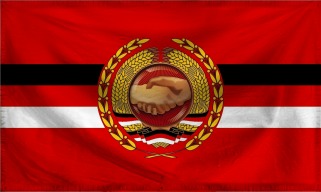| Category: Inoffensive Centrist Democracy | ||
| Civil Rights: Average |
Economy: Frightening |
Political Freedoms: Very Good |
Regional Influence: Auxiliary
Location: Novastralix
1
Union Democracy

Voting
The political system of the Reich Union is a corporatist form of democratic system often called a Union Democracy. Like traditional corporatism it's a system of social organization that has at its base the grouping of humans according to the community of their natural interests and social functions, and as true and proper organs of the state they direct and coordinate labor and capital in matters of common interest. The system is closely tied in with the culture and national philosophy of the Union. Political parties does not exist and are outlawed. All public power within the United Roman Reich proceeds from the people and the Volkstag (People's Diet) is the citizens foremost representative. The corporatist democratic system of the Reich Union manifests itself in a compulsory voting system and compulsory membership in local unions.
When a citizen turn 21 years old they reach the age of majority and are considered legal adults by the law. Once the age of majority is reached a citizen will be placed in, or as more commonly is the case, assign for membership in a local union. The type of union one is allowed to apply for is only one that reflects one's trade or civilian status, commonly one that represents the individuals current employment.
It is illegal to not be a member of a union once one have reached the age of majority and if one finds him or herself unable to chose a union by themselves one will automatically be assigned to the union responsible for one's current employment or civil status.
- (People that suffer from chronic illness or are disabled in any way, shape or from, may apply for unions that represent their bodies and problems within society. In such a case one can be a member of multiple unions, one representing one's trade and one representing one's disability. It is however only possible to participate in one union's Union Election for the Volkstag. One can vote in regular union elections in both unions however. A union membership in which the individual is not allowed to vote in the UEV is called Honorary membership.)
As a member of a union one is responsible for voting in union elections were representatives within the unions are elected for higher positions.
Public Elections
Once every 4 years all unions hold the Union Election for the Volkstag (People's Diet). This is when the union members vote for which person they want to represent them and their union within the Volkstag.
(In comparison to other nations utilizing parliamentary democracy this is the same type of election as when politicians representing political parties are elected into government. In this case statesmen in the form of union representatives takes the politicians place.)
Elected representatives takes a seat in the Volkstag. The number of seats per union is calculated based on the total number of members per union giving the Diet the same composition as the unions throughout the Reich Union.
Once the composition of the Volkstag is done the Diet will be presented by Reichskanzler-candidates. These candidates are elected by the Reich Committee for Ideological State Security and by the unions themselves, after having been cleared by the RCISS.
Once all candidates are made clear the Diet holds a vote which will be repeated until one candidate have more that 50% of the votes.
The winning candidates will be elected Reichskanzler, formally appointed by the Chairman of the Volkstag. The Reichskanzler then handpick statesmen that will form the Reich Council (i.e. the government) as heads of their appointed ministries.




 Latest Threads
Latest Threads





